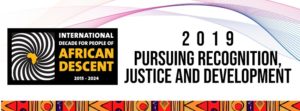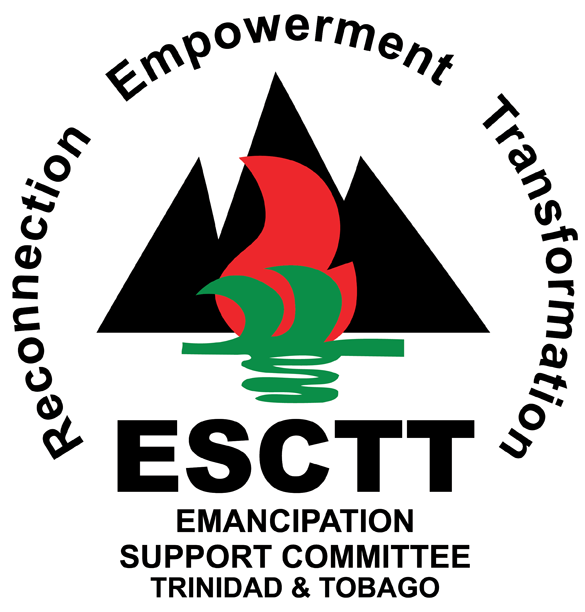
In 2019, as the Emancipation Support Committee of Trinidad & Tobago hosts its 26th Pan-African Festival TT in Commemoration of Emancipation, we have selected for our theme:
Pursuing Recognition Justice and Development
The theme pointedly incorporates the watchwords of the United Nations International Decade for People of African Descent (IDPAD) January 1, 2015 – December 31, 2024 – recognition , justice and development. The decision to host this decade with these watchwords was adopted at a meeting of the UN General Assembly on December 23, 2013. In December 2014 delegates agreed on a Programme of Action (POA). The POA signaled that the Decade was not meant to be an empty gesture but the creation of an environment and incentive to have major problems affecting African populations globally addressed at multiple levels – from non-governmental organizations (NGO’s), to private sector bodies, to national governments and multilateral agencies.
In 2019, as we reach the halfway mark of the Decade, objectives are far from being realized. Many non-governmental organizations globally, including the Emancipation Support Committee of Trinidad & Tobago and several other local organizations, as well as the Caribbean Pan African Network for which we serve as the Secretariat, have organized relevant programs and sought to get the involvement of respective governments. This is important since many of the programs agreed to in 2014 involve policy issues, institutional and legislative actions which require governmental action.
In the main however governments have not lived up to their commitments. In fact concern about the low-keyed response to the decade triggered Human Rights entities within the United Nations to hold talks with representatives of the African Union following which the AU agreed to assist in stimulating the process. The first outcome of this was a meeting of UN representatives, government officials, global pan-African organizations, including the ESCTT, scholars and activists which was convened in Ghana in September 2018, a major move to trigger followup.
Upholding Trinidad & Tobago’s Pan African Legacy
Our choice of theme declares our intention to step up the ESCTT’s role in a manner consistent with the importance of the Decade’s objectives and befitting our country’s legacy. Trinidad and Tobago historically distinguished itself in the pan-African movement, a movement that played an important role in the global decolonization process. The very term “Pan-Africanism” entered the political vocabulary as a result of the First Pan-African Conference convened in London in 1900 by a Trinidad and Tobago citizen, Henry Sylvestre Williams. Many significant national scholars, activists and political figures achieved high-level recognition within the pan-African movement, including CLR James, Kwame Ture, Claudia Jones and Dr. Eric Williams.
The determination of the ESCTT to uphold and strengthen this legacy is demonstrated in core areas of its activity. These include the organization’s institutional relationship with arms of the African Union Commission; its focus on building this country’s economic and business links with the African continent, a prominent aspect of its annual Trans-Atlantic Trade and Investment Forum; the character of its annual marketplace with an African aesthetic and pan-African participation; its educational thrust and cultural programs. We invite fellow citizens and government to come together to embrace a momentum that can bring greater harmony to our country and progressively transform its development path. Indeed, our theme provides an opportunity and incentive for the government of Trinidad and Tobago to affirm its support for the UN Decade for People of African Descent and to commit to collaborative actions that would fulfill our country’s UN obligations in that regard.
Relevance of the Watchwords
Outside of the governmental sphere, all of us as nationals of Trinidad and Tobago need to remember and seek to give meaning to the watchwords – recognition, justice and development. They are relevant to all our citizens but with particular focus on our African citizens in the context of the IDPAD. Those of us who are African have the primary responsibility to examine what needs to be done and to each contribute his/her maximum effort to overcoming the challenges. We also have to ensure the widest possible understanding of the Decade throughout the society and to stimulate appropriate attention and actions from relevant authorities designed to achieve its goals.
RECOGNITION
The Programme of Action draws attention to two aspects of recognition. Self- recognition calls on those of us who are African to examine and address challenges in the way we see ourselves. Recognition draws on the way others see us and urges the entire society to participate in changing mindsets, conscious and unconscious biases, which result in discriminatory actions, some of which have very negative consequences for Africans.
Self-Recognition
To a large extent the way we see ourselves is contaminated by many influences. These include outright lies about our history which are widely believed; untreated trauma – from centuries of extreme abuse – which is passed from generation to generation; continuous exposure to negative portrayals of ourselves in mass media combined with a marked absence of information on our people’s significant achievements, past and present . Negative information and images are reinforced by prejudices of race, colour and class which we have unconsciously internalized. These prejudices rob us of empathy, understanding and insights into major social problems affecting some of our communities.
Recognition
In terms of recognition by the wider society there are real challenges in the way Africans are seen by others. Racism was a core component of slavery and colonization and continues in the culture. The perceptions of immigrants who arrived in the post-slavery period have been influenced by the racist structure of the local society and its relegation of Africans. This augmented the prejudices of race, colour and culture with which some arrived. Currently economic gaps between Africans and later immigrant groups, and educational gaps are widening visibly, reinforcing negative perceptions about Africans.
Even visually, in our built spaces, monuments and street names the presence and achievements of Africans over hundreds of years are barely acknowledged. Colonial monsters are venerated while those who contributed to the nation’s freedom, development and international recognition are ignored.
JUSTICE
Africans in the Criminal Justice System
To judge by the overwhelming proportion of Africans who are currently incarcerated in the country’s prison system (and this is a long standing pattern) the current “Justice” system in Trinidad and Tobago is weighed against Africans, particularly African youth. The grave disproportion both in the remand yard and the cells of the convicted cannot be explained simply by saying Africans commit more crimes. Other critical factors include – race and class profiling (affecting both arrests and sentencing); outright misbehaviour on the part of certain police officers – which includes frame-ups of individuals, with mainly Africans falling victim; corruption (at all levels of the Justice system) which protects certain groups and individuals, many of them non-African; differences in access to bail based on income and property ownership. A recent statistic provided by the country’s attorney general highlights another causal factor – in the last 11 years 80,000 persons were jailed for marijuana possession. The vast majority would be African youth.
Structural Injustice
Injustice is also intrinsic in the existing levels of inequality, seen disparities of income and wealth, uneven access to jobs – “mih papers no use” in the words of calypsonian Mudada, declining educational opportunity (now even the “papers” are elusive), absence of material to engender positive African identity in the education system, housing and environmental conditions in some areas. In the over presence of condemnatory rhetoric and violence and an absence of solution oriented approaches, all these indices are getting worse for a number of African communities.
DEVELOPMENT
Historically Africans in Trinidad and Tobago have played a critical role in its development by overcoming a major hurdle to human development, chattel slavery, as part of a regional struggle led by Haiti. Africans then led the critical political struggle for decolonization which eventually yielded formal independence. They were predominant in the early fights for workers’ rights which led to the formation of trade unions. Despite deliberate barriers by the colonial authorities Africans fought, with increasing success, to broaden formal educational opportunity. Remarkable strides in economic entrepreneurship were made, particularly in the early 20th century, against institutional odds. Significant steps were taken by an African-led government, pushed by the 1970 Black Power movement, to increase the national share in ownership and control of prime national resources.
The current reality however is that Africans are far less prominent in shaping national development at the economic level. The multi-nationals have reasserted themselves in significant ways. Nationally owned enterprises are corrupted in part by political party agendas. Indications are that Africans are falling further and further behind at the level of the private sector.
In one of the most critical areas for shaping the development of the society in the future – education – a recent report points to a virtual state of emergency where academic performance in several African-dominated schools is concerned. This pattern does not portend well for the future of the society and must be addressed as a matter of urgency.
Ensuring the Success of IDPAD
When we choose these watchwords therefore we are aligning ourselves with a global movement, stimulated by the United Nations International Decade for People of African Descent. We are adding our organizational energy to the necessary corrective thrust. In the process we expect to generate broader national engagement, including that of the Government of Trinidad & Tobago, with the ideals and actions necessary to make the Decade meaningful.
